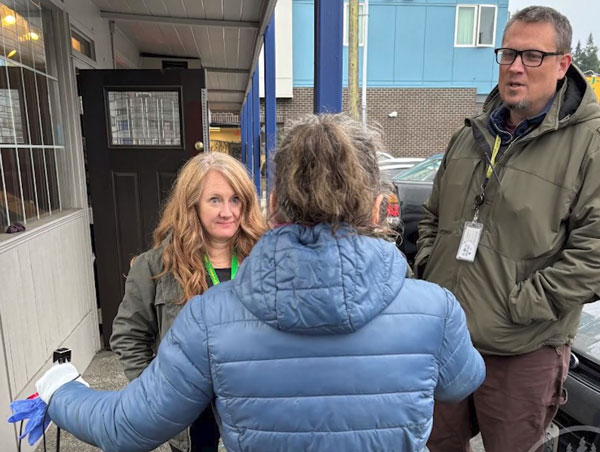Working together, five North King County cities build a solution to behavioral health crises overwhelming first responders.
By: Allyson Meyer

Principal members of North King County’s Regional Crisis Response (RCR) Agency (left to right): Heather Lantz-Brazil, Administrative Assistant, RCR Agency | Kurt Triplett, City Manager, Kirkland | Stephanie Lucash, Deputy City Manager, Kenmore | Brook Buettner, Executive Director, RCR Agency | John Ramsdell, Councilmember, Shoreline | Larry Goldman, Councilmember, Lake Forest Park | Neal Black, Councilmember, Kirkland | Jenne Alderks, Councilmember, Bothell | Debra Srebnik, Councilmember, Kenmore | Kyle Stannert, City Manager, Bothell | Phillip Hill, City Administrator, Lake Forest Park. Credit: Heather Lantz-Brazil
In 2023, the cities of Bothell, Kenmore, Kirkland, Lake Forest Park, and Shoreline partnered to launch the Regional Crisis Response (RCR) Agency, a strike team of 13 mental health professionals pooled from across the five cities that would respond to the flood of behavioral health-related 911 calls traditionally handled by law enforcement, public health and other agencies that might not be best suited for first response.
“Historically, what all cities have seen is when people are in a behavioral health crisis, taking them to jail or overcrowded emergency departments isn’t the right solution,” explains Kirkland Mayor Kelli Curtis. “Neither provide people in crisis with the resources and the stability they need.”
When a 911 call is determined to involve someone having a mental health emergency, RCR (locally known as “racer”) crisis responders are dispatched with police. When safe and appropriate, crisis responders can take over the scene, freeing the officers to resume patrol duties.

Crisis responders in Shoreline. Credit: Brook Buettner
“This allows officers to focus on their main responsibility—public safety,” says Kirkland Police Chief Cherie Harris. “For people in crisis, responders can help them avoid entering into the legal system by connecting them with necessary resources instead.”
RCR provides alternatives to police response in community crises, says Kirkland Councilmember Neal Black, adding that the agency’s goal is to provide those in crisis with someone to call, someone to address their needs, and, ultimately, give them somewhere to go. The RCR Agency was created from the Response Awareness, De-escalation and Referral (RADAR) program, which previously served the five RCR cities, and the city of Kirkland’s Community Safety Initiative, approved in the 2021-2022 budget.
“Throughout 2020 and across the country, communities reexamined how best to respond to certain types of emergencies in our community,” adds Black. “We took that reexamination seriously, and our approach was not reducing funding for law enforcement or reducing our commitment to public safety. Instead, we looked at how we can do first response better.”
The solution: a new class of first responders who arrive on scene equipped with the specialized mental health training that’s needed to deescalate and resolve certain situations.
During its first year, RCR (funded collectively by the five partner cities, drawing on regional, state, and federal grants) served 866 people in 2,700 encounters.
“What that tells us is there are multiple responses to the same individuals who are in crisis and need stabilization and de-escalation,” says Mayor Curtis.
“We have received a great deal of positive feedback from people who have received services about how valuable and helpful it was to them to talk to a crisis responder in their moment of great distress,” adds RCR Executive Director Brook Buettner. “We have also seen the work help build trust in our public safety system more broadly, because people are seeing that they are getting the right response at the right time from a team of people with the right skills to help them.”
In 2024, with a $21 million grant from the State of Washington and King County, RCR cities await the opening of a new Crisis Response Center in Kirkland, a “no wrong door” walk-in clinic that will operate 24 hours a day, seven days a week and will provide mental health services to all comers, regardless of severity of need or insurance status, with no appointment required. Connections Health Solutions, a private behavioral health services provider, will operate the new center in partnership with RCR and the RCR cities.
“Behaviorial health needs don’t stop at the city border. We recognize the need to be collaborative and partner in this work,” says Curtis. “I think anybody who runs for elected office wants to protect their community and make sure it is healthy and safe. You do this work because you want to solve problems and you want to help people. This is an example of leadership stepping up and working to come up with the right solution.”
Behaviorial health needs don’t stop at the city border. We recognize the need to be collaborative and partner in this work.